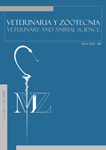Authors
Abstract
ABSTRACT: The present study reports the recurrence of the canine Ehrlichiosis in the city of Cali - Colombia, according to the race, sex and age of the dogs. This is a retrospective type study, in which secondary sources of 101 canine blood samples were used. The samples were analyzed using the ELISA method of a commercial test for the detection of specific antibodies against Erlichiae canis. The results showed that the canines belonging to Labrador, Poodle and Schnauzer breeds showed greater presence of antibodies against the disease. Canines of both sexes, ranging from 6 to 144 months old were affected by the disease. Under the conditions for the present study, it can be concluded that the causing agent for canine Erlichiosis is affecting the canine population in Cali, being the Labrador breed the most affected by the parasite, as well as adult male dogs.
Keywords
References
Biogal Galed Labs. Product Information. ImmunoComb® canine ehrlichia antibody test kit. Catalog Nº 50CEH201/50CEH210. Biogal Galed Labs, Israel. Disponible en:
Branger, S.; Rolain, J.M.; Raoult, D. Evaluation of Antibiotic Susceptibilities of Ehrlichia canis, Ehrlichia chaffeensis, and Anaplasma phagocytophilum by Real-Time PCR. Antimicrobials Agents Chemotherapy. v.48, n.12, p.4822–4828, 2004.
DANE. Censo general 2005. Departamento Administrativo Nacional de Estadística. República de Colombia.
Espitia, A.; Revueltas, G.C.; Mendoza, A.E. Prevalencia de Ehrlichia canis en la ciudad de Montería, Córdoba, Colombia. MVZ – Córdoba. v.5, n.2, p.20, 2000.
Gal, A.; Loeb, E.; Yisaschar-Mekuza, Y.; et al. Detection of Ehrlichia canis by PCR in different tissues obtained during necropsy from dogs surveyed for naturally occurring canine monocytic ehrlichiosis. The Veterinary Journal. v.175, p.212–217, 2008.
Gómez, L.F.; Alzate, G.J.; Orozco, S.C. Reporte de un caso de Dirofilaria immitis en un perro. Hallazgo de antígenos de y confirmación del parásito a la necropsia. Revista Colombiana de Ciencias Pecuarias. v.19, n.1, p.70-79, 2006.
Harrus, S.; Waner, T.; Brak, H.; et al. Recent Advances in Determining the Pathogenesis of Canine Monocytic Ehrlichiosis. Journal of Clinical Microbiology. v.37, n.9, p.2745–2749, 1999.
McQuiston, J.H.; McCall, C.L.; Nicholson, W.L. Ehrlichiosis and related infections. Journal of American Veterinary Medical Association. v.223, n.12, p.1750-1756, 2003.
O’Connor, T.P.; Hanscom, J.L.; Hegarty, B.C.; et al. Comparison of an indirect immunofluorescence assay, western blot analysis, and a commercially available ELISA for detection of Ehrlichia canis antibodies in canine sera. Journal of American Veterinary Medical Association. v.67, n.2, p.206-210, 2006.
Otranto, D.; Paradies, P.; Testini, G.; et al. Application of 10% imidacloprid /50% permethrin to prevent Ehrlichia canis exposure in dogs under natural conditions. Veterinary Parasitology. v.153, n.3- 4, p.320-328, 2008.
Pusterla, N.; Huder, J.; Wolfensberger C.; et al. Granulocytic Ehrlichiosis in Two Dogs in Switzerland. Journal of Clinical Microbiology. v.35, n.9, p.2307-2309, 1997.
Sainz, A.; Amusategui, I.; Rodríguez, F.; et al. Las Ehrlichiosis en el perro: presente y futuro. Profesión Veterinaria. v.12, n.47, p.22-28, 2000.
Santafé, L.M. Muestreo para determinar la población de caninos y felinos en el municipio de Santiago de Cali. Secretaria de Salud Pública Municipal de Santiago de Cali. Centro de Zoonosis. 2004.
Seaman, R.L.; Kania, S.A.; Hegarty, B.C.; et al.; Breitschwerdt E.B. Comparison of results for serologic testing and a polymerase chain reaction assay to determine the prevalence of stray dogs in eastern Tennessee seropositive to Ehrlichia canis. Journal of American Veterinary Medical Association. v.65, n.9, p.1200-1203, 2004.
Waner, T.; Harrus, S.; Jongejan, F.; et al. Significance of serological testing for ehrlichial diseases in dogs with special emphasis on the diagnosis of canine monocytic ehrlichiosis caused by Ehrlichia canis. Veterinary Parasitology. v.95, p.1–15, 2001.
Watanabe, M.; Oikawa, T.; Hiraoka, H.; et al. Experimental inoculation of beagle dogs with Ehrlichia species detected from Ixodes ovatus. Veterinary Parasitology. v.136, p.147–154, 2006.

 PDF (Español)
PDF (Español)
 FLIP
FLIP










